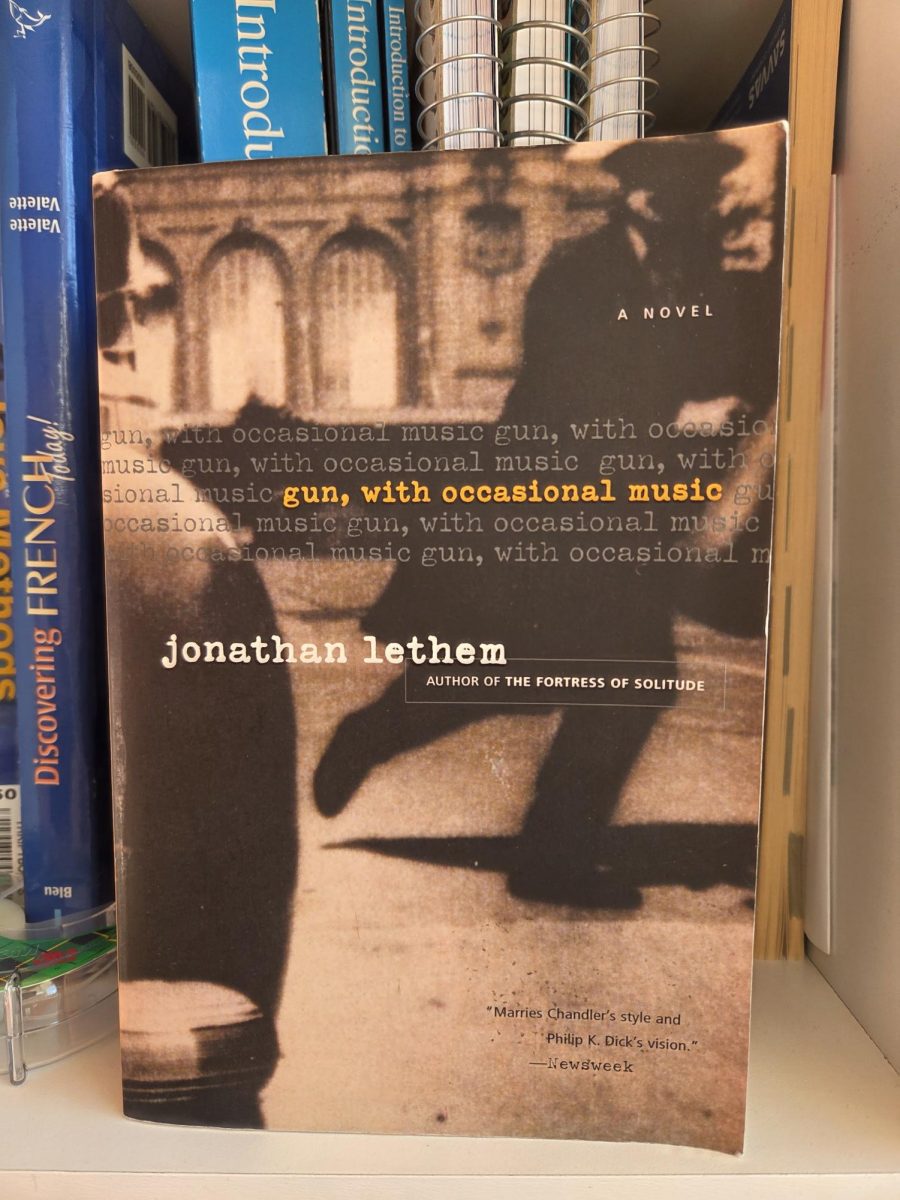Musical Musings Episode 2: Encanto
March 24, 2022
This is the second installment of Musical Musings, a podcast where Aquila staff members review and discuss music albums. In this episode, Erica and Irene share their thoughts on the soundtrack of Disney’s “Encanto,” released Nov. 24.
Irene: Hello. Welcome to “Musical Musings,” a podcast repeater where Aquila staff members discuss and review music albums.
Erica: Today we’ll be discussing the music from the new movie “Encanto” that came out November 24, 2021. You can now watch the movie on Disney+ and listen to the soundtrack on YouTube. Let’s open with a sample of “We Don’t Talk about Bruno,” the breakout hit that peaked at number two on Billboards, becoming the second highest charting song ever from a Disney animated film.
“We Don’t Talk about Bruno” excerpt: “We don’t talk about Bruno, no, no, no! We don’t talk about Bruno.”
Irene: Hello, I’m Irene.
Erica: And this is Erica. So, the soundtrack from “Encanto” was actually number one on the Billboard 200 Albums chart on Jan. 15, and it is the first Disney soundtrack to do so since “Frozen II” in 2019.
Irene: So actually, I first was not into the “Encanto” craze. My brother had watched the movie at home. And I was still trying to watch my Marvel movies. So I was unappreciative of the fact that he was watching a non-Marvel movie. But he started playing “We Don’t Talk about Bruno” with the Alexa every single day. And I initially was like, I initially, I usually don’t really appreciate his music taste. He likes Kpop. I don’t. So, ooh, that’s gonna be controversial. But I think it was that one line in “We Don’t Talk about Bruno,” the one about being betrothed to another. That was all like my hopeless romantic heart, I have to read this plotline and listen to the music because like this line, like, really got to me. That was kind of how I started listening to the soundtrack myself.
Erica: Yeah, I actually wasn’t planning on watching the movie either until my little sister also was playing “We Don’t Talk about Bruno” on her laptop. And then, I was really intrigued because it was very unique in a sense. They used a lot of Colombian traits, I guess, that you find a lot in traditional Colombian music. And I thought that was really interesting as well. And so I actually wanted to listen to more and see some other songs. I really fell in love with “Surface Pressure” especially because I don’t think Disney does a lot of songs where they really delve into like the pressures of older sisters and kind of the pressures of each family members’ burdens.
“Surface Pressure” excerpt: “Pressure like a drip, drip, drip, that’ll never stop, woah-oh (Pressure, pressure). Pressure that’ll tip, tip, tip ‘til you just go pop, woah-oh-oh-oh (Pressure, pressure).”
Erica: And so I felt that listening to “Surface Pressure,” I was able to relate to a lot of the messages in “Surface Pressure,” which I just, I mean, I wasn’t expecting Disney to come out with a song talking about that. So for me that was really unique. And then I ended up watching the entire movie. I came into the movie not knowing that it was written by Lin Manuel Miranda. But after listening to “Surface Pressure,” I think it was pretty obvious that Lin Manuel Miranda wrote the lyrics because of all the unique rhymes, like I think he rhymes Cerberus with surface or something.
“Surface Pressure” excerpt: “Under the surface, was Hercules ever like, ‘Yo, I don’t wanna fight Cerberus’? Under the surface.”
Irene: Yeah, for me realizing that he wrote the music was, “We Don’t Talk about Bruno,” the ending where all the voices are overlapping.
“We Don’t Talk about Bruno” excerpt: “A seven-foot frame, rats along his back; he told me that the life of my dreams; in doing so, he floods my brian; Abuela, get the umbrellas; would be just out of reach, betrothed to another, another; when he calls your name, it all fades to black; would be promised and someday be mine.”
Irene: That was for me, so reminiscent of “Nonstop” from “Hamilton.”
“Nonstop” excerpt: “History has it’s eyes on you; look around look around; non-stop; he will never be satisfied”
Irene: Where they’re all like overlapping and I was like, you know, this has to be Lin-Manuel Miranda. And that was kind of when I realized, but yeah, I agree. The messages in a lot of the songs are very different from I feel what Disney usually does. And I also really liked in a lot of these big numbers like “We Don’t Talk about Bruno,” the diversity of character voices in the music. You can really tell each character apart and they kind of retain some of their character voice, like “We Don’t Talk about Bruno,” it really captured the essence of each character. And the voices also change. In “We Don’t Talk about Bruno,” when Isabella has that part where she descends from the ceiling, and she starts singing, it’s very typical, like Disney Princess singing, like, light, airy.
“We Don’t Talk about Bruno” excerpt: “He told me that the life of my dreams would be promised and someday be mine.”
Irene: But then when she explores more in “What Else Can I Do,” she kind of gets further away from that Disney Princess style, I guess, of singing, and which kind of really shows her character development.
“What Else Can I Do” excerpt: “A hurricane of jacarandas, strangling figs (big!), hanging vines (this is fine).”
Erica: The other female characters, the sisters, also have quite a distinct and unusual voice when they’re singing.
Irene: It was very refreshing that Mirabel, her singing was lower. She had a lower voice.
“Welcome to the Family Madrigal” excerpt: “Welcome to the family Madrigal, the home of the family Madrigal. We’re on our way.”
Irene: And that’s not a typical Snow White, Cinderella type of singing.
Erica: In “The Family Madrigal,” we see a lot of themes of each of the characters represented in music.
“Welcome to the Family Madrigal” excerpt: “My tio Bruno. We don’t talk about Bruno.”
Irene: Also, “We Don’t Talk about Bruno,” in “All of You,” I thought there was a nice callback when I think Bruno shows up and Camillo goes, “So, we’re going to talk about Bruno?”
“All of You” excerpt: “Okay, so, we gonna talk about Bruno? That’s Bruno.”
Irene: I thought that part was really cute.
Erica: Yeah, Camillo is such an underrated character. He doesn’t have his own song.
Irene: That’s what I was saying, he needs his own song.
Erica: Yeah. His part in “We Don’t Talk about Bruno” was so good.
Irene: Oh, and also how he changes his … I mean, obviously with his shape-shifting, he changes his voice. And that part in “We Don’t Talk about Bruno” where he changes into Mariano and he goes …
Erica and Irene: Isabella, your boyfriend’s here!
“We Don’t Talk about Bruno” excerpt: “Isabella, your boyfriend’s here!”
Irene: I really liked that part.
Erica: And also, when he transforms into Bruno, now that you mention it, he has this growl in his voice, so like “rats along his back,” he drags his voice a little bit.
“We Don’t Talk about Bruno” excerpt: “A seven-foot frame, rats along his back.”
Irene: His actor actually wasn’t a singer.
Erica: Oh, really?
Irene: I think I was reading that some of the other actors had vocal training, but he didn’t. There’s just these themes that go across the different songs, which really ties it all nicely together. If this was, for example, maybe not a movie and a TV series or something, I feel they could have delved into each individual family members’ struggles more with their gifts, like for example, with Dolores in the movie, you can see when everybody’s being loud she’ll cover her ears because of her super sensitive hearing. I know in the movie, you can’t focus on everybody because it’s such a large cast. You have three kids on each side of the family. So, obviously it’s a lot of ground to cover. But I just liked the individual songs so much and how they captured each essence that I wish I could have heard more. I would want a Dolores song, a Camillo song and all that.
Erica: Speaking of diversity in the cast, as we mentioned a little bit earlier, a lot of the songs include Colombian folklore, cultural music in the soundtrack. So I think especially the title song, “Colombia, mi Encanto.”
“Colombia, mi Encanto” excerpt: “Colombia stays my favorite place. Colombia, te quiero tanto. Que siempre me enamora tu encanto.”
Erica: They actually had a really famous Colombian singer, Carlos Vives, sing “Colombia, mi Encanto,” to bring more authentic Colombian music to a movie that really puts Colombia in a light that I don’t think a lot of Western audiences are exposed to usually. I think Smithsonian interviewed Carlos Vives. And he talked about how he really appreciated Lin-Manuel Miranda really going to him and asking, “Is this right? Am I incorporating Colombian themes correctly?” which I thought was really unique. And I also liked how in kind of the climax of the movie where Abuela is telling Mirabel about her past, and we see how Abuela had to face the death of her beloved, they used a song entirely in Spanish.
“Dos Oruguitas” excerpt: “Dos oruguitas paran el viento mientras se abrazan con sentimiento.”
Erica: Lin Manuel Miranda thought it important to first write the song completely in Spanish before then translating it into English. And the English version of the song doesn’t actually appear in the film, it shows up in the end credits, although it’s also a very beautiful version of the song.
Erica: Miranda isn’t Colombian, but he is Puerto Rican. So I think bringing that emphasis on Latinx language and Latinx heritage is very important. And I also think it’s very nice that in a lot of the other songs, you have a lot of background noise and a lot of layerings. But for “Dos Oruguitas,” it’s so simple.
Irene: Yeah.
Erica: You have that acoustic guitar to start off, and then this beautiful voice singing the melody.
“Dos Oruguitas” excerpt: “Dos oruguitas, enamoradas.”
Erica: And I think it really emphasizes that theme of transformation or metamorphosis that the song discusses.
Irene: I would think that would be my favorite song as well. When I first started, I was all about “We Don’t Talk about Bruno,” but there’s just something, it’s so sad. It’s stripped of all the other elements. And it’s heart wrenching. And I think it is definitely my favorite as well, though I do love the interaction of elements in “All of You” and “We Don’t Talk about Bruno,” and all the character that is in those songs, I can’t. It’s still my favorite.
Erica: It has a very raw element that the other songs don’t have. They really went back to that Colombian heritage and that Colombian fusion of mixing folklore and cultural music with a modern essence. So I thought that was really really special that they chose to use a Colombian song at the climax of the movie.
Irene: And because it is a movie, you don’t necessarily have to understand the lyrics of the song. You could see the visual storytelling as well and I thought that was a very powerful combination. Speaking of Colombian influences, we also saw a lot of instruments we don’t usually see in this type of movie. I think in “The Family Madrigal” she starts playing the accordion or something.
“The Family Madrigal” excerpt
Erica: And speaking of Colombian influence on the music, “Waiting on a Miracle” is quite different from the other songs on the track. It has a ¾ waltz-like time signature.
“Waiting on a Miracle” excerpt: “Someone, please just let me know. Where do I go? I am waiting on a miracle, a miracle.”
Erica: And first when you listen to the song, I didn’t really notice any connection to Colombian heritage, at least any that was very noticeable. But actually, after digging into it a little bit, that time signature used in “Waiting on a Miracle” is actually used a lot in local musicians in Colombia, which I thought was really interesting, because it’s a song that distinctuates Mirabel as a character, but at the same time, it’s still very deeply rooted in Colombian heritage.
Irene: Yeah, and I think it’s really cool that the people who worked on this movie took I believe it was a research trip to Colombia in 2018, which was three years before the movie was released. So I think it was very good of them to take that. And as you were talking about earlier, with Lin Manuel Miranda bouncing ideas off.
Erica: Carlos Vives, the singer of “Columbia, Mi Encanto.”
Erica: Thank you guys for listening to today’s episode of …
Erica and Irene: “Musical Musings.”
Erica: And to outro, we are going to listen to our favorite, “Dos Oruguitas.”
Irene: In Spanish.
“Dos Oruguitas” excerpt: “Nuestro milagro (Nuestro milagro). Ay, mariposas, no se aguanten más. Hay que crecer aparte y volver, hacia adelante seguirás. Ya son milagros, rompiendo crisálidas. Hay que volar, hay que encontrar su propio futuro.”


















![“[Building nerf blasters] became this outlet of creativity for me that hasn't been matched by anything else. The process [of] making a build complete to your desire is such a painstakingly difficult process, but I've had to learn from [the skills needed from] soldering to proper painting. There's so many different options for everything, if you think about it, it exists. The best part is [that] if it doesn't exist, you can build it yourself," Ishaan Parate said.](https://harkeraquila.com/wp-content/uploads/2022/08/DSC_8149-900x604.jpg)




![“When I came into high school, I was ready to be a follower. But DECA was a game changer for me. It helped me overcome my fear of public speaking, and it's played such a major role in who I've become today. To be able to successfully lead a chapter of 150 students, an officer team and be one of the upperclassmen I once really admired is something I'm [really] proud of,” Anvitha Tummala ('21) said.](https://harkeraquila.com/wp-content/uploads/2021/07/Screen-Shot-2021-07-25-at-9.50.05-AM-900x594.png)







![“I think getting up in the morning and having a sense of purpose [is exciting]. I think without a certain amount of drive, life is kind of obsolete and mundane, and I think having that every single day is what makes each day unique and kind of makes life exciting,” Neymika Jain (12) said.](https://harkeraquila.com/wp-content/uploads/2017/06/Screen-Shot-2017-06-03-at-4.54.16-PM.png)








![“My slogan is ‘slow feet, don’t eat, and I’m hungry.’ You need to run fast to get where you are–you aren't going to get those championships if you aren't fast,” Angel Cervantes (12) said. “I want to do well in school on my tests and in track and win championships for my team. I live by that, [and] I can do that anywhere: in the classroom or on the field.”](https://harkeraquila.com/wp-content/uploads/2018/06/DSC5146-900x601.jpg)
![“[Volleyball has] taught me how to fall correctly, and another thing it taught is that you don’t have to be the best at something to be good at it. If you just hit the ball in a smart way, then it still scores points and you’re good at it. You could be a background player and still make a much bigger impact on the team than you would think,” Anya Gert (’20) said.](https://harkeraquila.com/wp-content/uploads/2020/06/AnnaGert_JinTuan_HoHPhotoEdited-600x900.jpeg)

![“I'm not nearly there yet, but [my confidence has] definitely been getting better since I was pretty shy and timid coming into Harker my freshman year. I know that there's a lot of people that are really confident in what they do, and I really admire them. Everyone's so driven and that has really pushed me to kind of try to find my own place in high school and be more confident,” Alyssa Huang (’20) said.](https://harkeraquila.com/wp-content/uploads/2020/06/AlyssaHuang_EmilyChen_HoHPhoto-900x749.jpeg)











